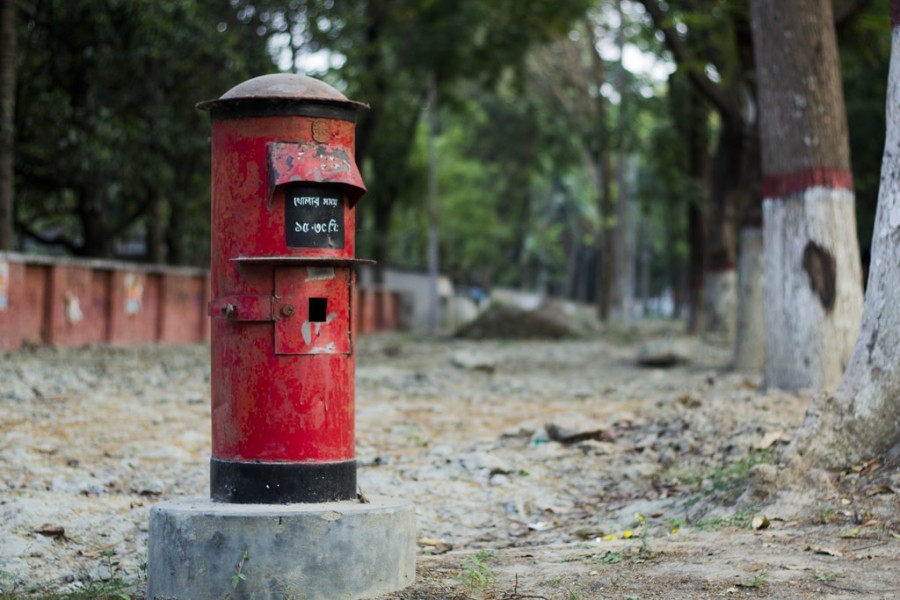The Prime Minister's inauguration of the 14-storey new Postal Building at Agargaon in the city is not merely a case of the opening of a freshly built state-of-the-art government office complex. The event held on May 27, marked the start of a new era in a vital segment of the state --- the Directorate of Posts. Although the postal service in Bangladesh has long been undergoing transformations into the online mode, it also retains some vestiges of the past. Those could be seen at the capital's General Post Office (GPO). Perhaps remnants of the now-discarded systems will be kept preserved as tokens of history. The fate of this more than a half-century-old postal building has yet to be known.
The Prime Minister has, however, made the chief objective of the new Postal Building, 'Dak Bhaban' in Bangla, clear. Although the objective of her government, like seen in the other departments, is connecting destinations through online network, in the present case stress has been placed on trade and business activities online. The Prime Minister has underscored the introduction of services enabling people to send and receive food items, fruits and vegetables through the postal service. The online-based operation is expected to expedite ordering and transportation of perishable commodities. This mode of business is set to emerge as imperative during times of restricted public transport movements like during pandemic lockdowns.
Many might feel tempted to compare the supply of products on demand with the postal parcels. Others may refer to the operation of private courier services. Both are different from the postal department's online delivery of commercial products. A common feature that characterises the parcel delivery of orders and courier services is the length of time. Both the services are time-consuming. The process of online sales and purchase of commodities is expected to be conducted at the shortest possible time. In operating its online business activities, the government-run postal department is said to press special 'courier vehicles' into service. As part of the programme to run the postal service online, the government has purchased 118 mail vehicles to extend services to the people. In case of increased demand of online orders, the number of these vehicles will see continued rises. The postal department has attached added importance to impart training to male and female workers on the delivery tasks.
In her speech while inaugurating the Dak Bhaban, the Prime Minister elaborated on the new activities to be undertaken by the department. It was leant that the postal freight services were set to take initiatives to install cooling system in the vans while transporting perishable goods from one place to another. To perform this task, special types of vehicles are needed. The authorities are now working towards procuring these vehicles. However, the jobs may hit snags. One of them is the higher charges demanded by the postal department. Already complaints of the fast-rising postal stamp charges for parcels and letters sent overseas have prompted many to turn to globally reputed courier services. Their charges are also exorbitantly high. But the reason people turn to these services is their promptness in the delivery of the parcels. Despite their satisfactory functions, the clients will look forward to the services at cheaper rates.
The postal department's internal functions going online, its increasing shift to offering online-based services and the courier operations of taking perishable products to the doorstep of clients may impress many. The plain truth is the main jobs of the postal department in Bangladesh, or at a broader scale in the sub-continent, comprised delivery of letters, money orders, rushing telegrams etc. Few could think of any major change in the nature of its work. In time, with the introduction of speedy transport modes in the rural areas, the postal 'runners' were not required to travel throughout days and nights braving natural calamities and bandits. The post of 'runners' was abolished. All of them were promoted to postmen. This and many other changes added to the responsibilities of the postman. His workload kept increasing, with the salary stuck in the earlier miserably meagre scale.
That this nature and environs of work will one day change so radically that the postmen would not need to move round the city streets under the scorching sun or amid downpours was unthinkable even a few decades back. Receiving letters at regular intervals was once a part of urban life. Few people nowadays write letters. In place of the missives, they have the mobile phones; the 'smarter' of them offering the facility of watching people on both ends of the small screen while talking. The educated segments of the people switch on their PCs or laptops to email longer letters. The persons at the opposite ends --- be they in Peru or Finland, receive the mails in a second. The post offices' internal works are now mostly done online. In Bangladesh even a few years ago, the accounting jobs of different postal savings and insurance services would be done manually. The works are fast being shifted to computers.
Queues in front of counters are getting shorter. Some remain closed for long. Few need to write letters. So they are not required to buy prescribed air-mail envelopesor costly postal stamps. Gone are the scenes of a postal clerk weighing letters to check if they have exceeded the postage charges. In Bangladesh, these once well-known scenes are fast vanishing. Given the digital age developments, post offices have few options before them except diversification of their functions and going online.


